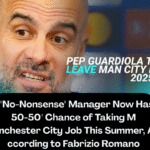Liverpool confirbed the sugning of Brazilians star

Football is filled with stories of rivalries, grudges, and unforgettable moments that stay in the hearts of fans forever. But few tales capture the tension and respect between Manchester United and Liverpool quite like the one involving Sir Alex Ferguson and Gary McAllister. What began as a harmless joke in a living room ended up creating a 20-year silence between one of football’s most successful managers and one of Liverpool’s most respected figures. This story is not just about rivalry—it’s about pride, misunderstanding, and the hidden humanity behind one of the toughest managers the game has ever seen.
It all began towards the end of the 1991–92 season, a campaign that marked the final days of the old First Division before the birth of the Premier League. Leeds United were locked in a fierce title race with Manchester United, and every game mattered. Gary McAllister, a key member of that Leeds side, was enjoying one of the best seasons of his career. Alongside players like Gordon Strachan, David Batty, and a young Eric Cantona, McAllister helped Leeds push Sir Alex Ferguson’s Manchester United to the limit. The rivalry between the two clubs was intense, and emotions were high as the season neared its end.
On that decisive weekend, Leeds had already done their part—they had beaten Sheffield United 3-2. All eyes then turned to Anfield, where Liverpool were hosting Manchester United. If United failed to win, Leeds would be crowned champions. McAllister and his teammates gathered at striker Lee Chapman’s house to watch the game. The mood was nervous but hopeful. The living room was filled with players, TV cameras, and the raw anticipation of what could become a historic day.
As fate would have it, Liverpool went on to beat Manchester United 2-0. Leeds United were officially champions. The atmosphere in Chapman’s house exploded with joy. McAllister later described it as one of the happiest moments of his career. But within minutes of the celebration, a few words slipped from his mouth—words that would haunt him for decades.
Because McAllister had done some television work, he was connected to the live broadcast feed from Anfield. Through his earpiece, he could hear the director giving instructions to camera operators and presenters. After the final whistle, the director’s voice came through clearly: “Get to the tunnel—we’ve got Fergie!” Seconds later, Sir Alex Ferguson appeared on screen, his face bright red, visibly furious after seeing his team’s title hopes collapse.
Ferguson, never one to hide his emotions, gave a heated post-match interview. “I want to make it clear,” he said sharply, “Leeds haven’t won the league—Manchester United have lost the league!” His tone was fierce, his disappointment obvious. Watching from Chapman’s living room, McAllister made a lighthearted remark that would change everything. “Big red-face as gracious as ever in defeat,” he joked to his teammates, thinking it was private. But then came the voice in his ear that froze him instantly. It was Denis Law, working with the broadcast team that day. “Gary,” Law said quietly, “Fergie can hear you.”
McAllister’s heart must have stopped. He realized that his comment had been heard by the one man in football you didn’t want to offend—Sir Alex Ferguson. What had been meant as a cheeky, offhand remark in a moment of celebration became a personal slight to one of the most proud and competitive figures in football. From that day on, Ferguson never spoke to McAllister again. “Alex Ferguson has walked past me in Lithuanian airports and Albanian hotels for 20 years and never looked in my direction,” McAllister once recalled with a mix of regret and disbelief.
For two decades, their paths crossed many times. As McAllister’s career evolved—from Leeds to Coventry City, then to Liverpool, and eventually into coaching—Ferguson remained a constant presence in English football. But every time they found themselves in the same place, the silence remained. Ferguson would walk past without a glance. McAllister, aware of his mistake, never tried to force a conversation. The wound, though unspoken, was there.
It might sound harsh, but those who knew Ferguson understood that he was a man driven by emotion, pride, and loyalty. His rivalries were personal. He fought for his players, his club, and his reputation with every ounce of his being. When McAllister made that comment, even as a joke, Ferguson saw it as disrespect. To him, football was war, and words mattered. He could forgive mistakes on the pitch, but not insults to his pride.
However, this story doesn’t end with bitterness. Years later, something extraordinary happened that revealed the true measure of Sir Alex Ferguson’s character. In 2006, tragedy struck Gary McAllister’s life when his wife, Denise, passed away after a long battle with cancer. It was one of the darkest periods of his life. And out of nowhere, the phone rang. On the other end was Sir Alex Ferguson.
“This is the measure of the man,” McAllister said years later. “When you’re competing against him, you’re the enemy, but when I went through this tragic experience, who was the first person to call me? Alex Ferguson.” The legendary manager not only offered his condolences but extended an open invitation. “He invited me to the training ground at Carrington,” McAllister explained. “He said, ‘You can come to training any day. You can come to Old Trafford to any game.’ The first mass card I got through the post was from his wife.”
In that moment, all the years of silence vanished. McAllister realized that behind Ferguson’s fiery personality was a heart filled with compassion. “You see this figure, when you’re competing against him, he’ll do anything to beat you. But there’s a gentle side to Alex Ferguson, and that’s something I learned down the line,” he said. “For 20 years, I did not exist—but when it mattered most, he was there.”
It’s a story that captures the complex nature of rivalry in football. Ferguson and McAllister represented clubs that despised each other on the pitch, yet beyond the white lines, there was mutual respect and humanity. The game often magnifies emotions—joy, anger, pride—but beneath it all, players and managers are still people. Ferguson’s gesture showed that even the fiercest competitors can show kindness when life calls for it.
The incident between Ferguson and McAllister has since become part of football folklore—a story fans retell not because of the insult, but because of the forgiveness. It’s a reminder of how words spoken in jest can carry weight, and how even the toughest men in football have soft hearts hidden beneath the armor. McAllister’s mistake was small, but it reflected how football’s intensity can blur the line between rivalry and respect.
As time went on, both men continued to contribute to the sport they loved. McAllister returned to Liverpool years later as part of the coaching team, helping guide a new generation. Ferguson retired in 2013, leaving behind one of the greatest managerial legacies in football history. And somewhere along that journey, the silence between them turned into quiet understanding. They may never have become close friends, but the bond forged through compassion was stronger than any grudge.
Today, when fans talk about the Manchester United–Liverpool rivalry, they often mention Ferguson’s famous quote about knocking Liverpool “off their f***ing perch.” But behind that fiery statement lies a story like this one—a story that reminds us that even legends are human, that behind the anger and competition lies empathy and respect. It’s easy to see Ferguson as the ruthless manager who demanded perfection from everyone around him, but stories like this show the heart that made him truly great.
Gary McAllister, for his part, has never hidden from the incident. He often tells the story with a smile now, aware of how it reflects both the madness and the beauty of football. “It was one of those moments,” he says. “You think you’re joking with your mates, and suddenly, you’ve just insulted one of the most powerful men in football live on air.” It’s a mistake that became a lesson—and ultimately, a story of forgiveness.
So, after 20 years of silence, two men who stood on opposite sides of football’s fiercest divide found a strange kind of peace. In a world where grudges often last forever, that moment of compassion spoke volumes. It showed that football, for all its rivalries and chaos, is still about people—about hearts that can heal and respect that can survive even the fiercest battles.















